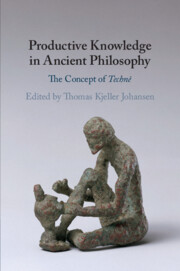Book contents
- Productive Knowledge in Ancient Philosophy
- Productive Knowledge in Ancient Philosophy
- Copyright page
- Contents
- Contributors
- Acknowledgements
- List of Abbreviations
- Introduction
- Chapter 1 Protagoras on Political Technê
- Chapter 2 Dynamic Modalities and Teleological Agency
- Chapter 3 Technê As a Model for Virtue in Plato
- Chapter 4 Crafting the Cosmos
- Chapter 5 Aristotle on Productive Understanding and Completeness
- Chapter 6 Technê and Empeiria
- Chapter 7 The Stoics on Technê and the Technai
- Chapter 8 The Epicureans on Technê and the Technai
- Chapter 9 The Sceptic’s Art
- Chapter 10 Plotinus on the Arts
- Chapter 11 Productive Knowledge in Proclus
- Bibliography
- General Index
- Index Locorum
Chapter 1 - Protagoras on Political Technê
Published online by Cambridge University Press: 14 January 2021
- Productive Knowledge in Ancient Philosophy
- Productive Knowledge in Ancient Philosophy
- Copyright page
- Contents
- Contributors
- Acknowledgements
- List of Abbreviations
- Introduction
- Chapter 1 Protagoras on Political Technê
- Chapter 2 Dynamic Modalities and Teleological Agency
- Chapter 3 Technê As a Model for Virtue in Plato
- Chapter 4 Crafting the Cosmos
- Chapter 5 Aristotle on Productive Understanding and Completeness
- Chapter 6 Technê and Empeiria
- Chapter 7 The Stoics on Technê and the Technai
- Chapter 8 The Epicureans on Technê and the Technai
- Chapter 9 The Sceptic’s Art
- Chapter 10 Plotinus on the Arts
- Chapter 11 Productive Knowledge in Proclus
- Bibliography
- General Index
- Index Locorum
Summary
How far is it possible to reconstruct the content of the ‘art of citizenship’ (politikê technê) professed by Protagoras in the dialogue Protagoras? Some commentators have claimed that Protagoras’ statements about the technê are incoherent. Examining this claim, Hussey argues that, while Protagoras can be defended on the charge of incoherence, his exposition of the nature and content of the technê he professes to possess and teach is radically incomplete in several ways. The question then arises whether the Theaetetus can be used to fill in the gaps that Protagoras of the Protagoras left for good practical reasons. If Protagoras’ remarks on truth and wisdom and the ‘changing of perceptions’ in the Theaetetus are taken in a pragmatist way, they imply a conception of a ‘technê of citizenship’ that is capable of improving/transforming human nature, and creating a public political consensus and a stable democratic society. There are many illuminating parallels to be drawn throughout, between the claims of Plato’s Protagoras for his ‘political art’ and the description of the medical art given in the pseudo-Hippocratic essay On Ancient Medicine. (It is assumed, but not argued, that Plato’s Protagoras is a substantially faithful portrait of the historical Protagoras.)
- Type
- Chapter
- Information
- Productive Knowledge in Ancient PhilosophyThe Concept of <I>Technê</I>, pp. 15 - 38Publisher: Cambridge University PressPrint publication year: 2021
- 1
- Cited by



